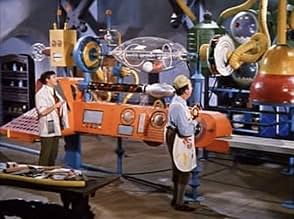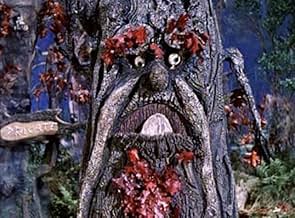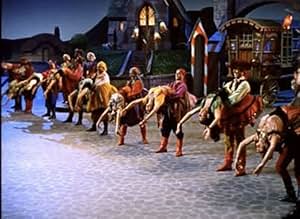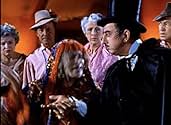Mary Contrary is set to marry Tom Piper when he is kidnapped by Roderigo and Gonzorgo, two goons working for the evil Barnaby who wants to marry Mary for her inheritance.Mary Contrary is set to marry Tom Piper when he is kidnapped by Roderigo and Gonzorgo, two goons working for the evil Barnaby who wants to marry Mary for her inheritance.Mary Contrary is set to marry Tom Piper when he is kidnapped by Roderigo and Gonzorgo, two goons working for the evil Barnaby who wants to marry Mary for her inheritance.
- Nominated for 2 Oscars
- 1 win & 6 nominations total
Annette Funicello
- Mary Quite Contrary
- (as Annette)
Leon Alton
- Villager
- (uncredited)
Don Anderson
- Villager
- (uncredited)
Marilee Arnold
- Twin
- (uncredited)
Melanie Arnold
- Twin
- (uncredited)
Robert Banas
- Russian Dancer
- (uncredited)
Tex Brodus
- Villager
- (uncredited)
Boyd Cabeen
- Villager
- (uncredited)
Storyline
Did you know
- TriviaThis was the first live-action musical that Disney Studios produced. It was as heavily promoted as the studio's other big films, but was a failure at the box office. It was one of the few Disney films never given a second run in the neighborhood theaters, or even re-released, as so many other Disney films were (it first appeared on television - in two one-hour segments telecast a week apart - only eight years after its original release. Eight years was usually the amount of time the Disney studios used to wait to re-release their films theatrically). Disney did not make another musical on this elaborate a scale until Mary Poppins (1964), which became its most successful film during Walt Disney's lifetime.
- GoofsWhen Gonzorgo and Roderigo are trying to hide from Barnaby after he discovers they sold Tom to the gypsies, he throws both of them over a hedge and on the ground. When they fall on the grass, it's obvious that it's artificial turf, because it moves with them.
- ConnectionsFeatured in The Magical World of Disney: Back Stage Party (1961)
- SoundtracksMother Goose Village and Lemonade
Music by Victor Herbert
Music adapted by George Bruns
Lemonade adapted from the instrumental piece "Military Ball"
Lyrics by Mel Leven
Sung by Chorus
Featured review
I used to think 'Chitty Chitty Bang Bang' was the very worst experience a parent could inflict on a child. I was wrong. There is also this Disney atrocity to contend with.
When Victor Herbert produced his 'Babes in Toyland' on Broadway in 1903, it followed on the steps of the preceding stage extravaganza, 'The Wizard of Oz', which it outdid in magnificence, costliness (its shipwreck scene outdid 'The Wizard's cyclone, its Toyland outdid the other's Emerald City, etc.), imagination and original melodies. It was eventually followed by another Victor Herbert Christmas spectacle, 'Little Nemo in Slumberland' (1908), which surpassed them all in spectacular stage effects, number of participants and box office. This was a magic time when sentimental Irish Catholic New-Yorkers genuinely believed that when they went to heaven, they would hear Victor Herbert's tunes sung by angel choirs until the end of time.
Unfortunately, all of Herbert's operettas would have been totally forgotten today if it hadn't been for the awful Hollywood Laurel and Hardy vehicle of the thirties ("Babes in Toyland", 1934, a.k.a. "Laurel and Hardy in Toyland", "March of the Wooden Soldiers", "Revenge Is Sweet" and "Wooden Soldiers"), which preserved its spirit of pantomime and most of its storyline but sacrificed its music by relegating the whole score (except for five songs) to a very scratchy and noisy background on the soundtrack.
Then came Disney. This film (available on DVD) is nothing more than an elaborate episode of the Mickey Mouse Club. The story has been changed around for no reason: the only remaining common element through all the different versions is that there is a villain in Mother Goose Land named Barnaby Barnacle, who wears a tall black top hat and a long moustache, has two funny acolytes in crime and is out to prevent a happy ending for the other younger cast members. The original songs have been simplified, modernized, 'disneyfied', 'cutified', 'Lawrence-Welked' and bowdlerized almost out of existence, probably because they would have been considered too 'difficult' for the intended nose-picking kiddie audience. This is very ironic since it contributed to 'Babes' downfall at the box office and served as a lesson to Disney who did everything in his power, subsequently, with 'Mary Poppins' to provide a great score, first-class singers, great orchestration, and a nostalgic feel closer to traditional turn-of-the century entertainments.
The only reason I am not harsher on Disney's story treatment is that it was followed in 1986 by an even worse live action treacly TV version and in 1997 by the definitely dismal animated one (MGM).
'I Can't Do the Sum', whose main musical idea was that a group of schoolchildren, perplexed by a mathematical problem verging on the absurd, would punctuate their singing by scratching their chalk rhythmically on their chalkboards is now without chalkboard sounds - and logic. The forest lullaby is without its mystery and comfort. The title song, the very inspiring 'Toyland', is not even given a proper (choral) rendition but is instead screeched by a group of untalented children walking through the forest as if on their way to the washrooms of an amusement park to regurgitate their candy floss.
Even 'The March of the Wooden Soldiers' (which has managed to survive on its own as a beloved orchestral Christmas favourite in America and a Boston Pops staple) is not even given the dignity of a proper Christian burial but truncated and drowned under a cacophony of sound effects and pie-in-the-face-type slapstick.
There is nothing to salvage this mess, not even the wholehearted effort of its cast, with a special tip of the hat to Tommy Sands in a Gypsy scene (in drag) somewhat reminiscent of Stanley Donen's 'The Pirate' (1948).
The only way to hear Victor Herbert's original score today - along with Glen MacDonough's original lyrics - is to hunt for a 2002 Universal CD reprising a 1944 mono studio recording of 11 of the original numbers (still heavily truncated) and the vinyl Readers' Digest 'Treasury of Operettas' 9-LP boxset, which contains 8 numbers, in very impressive 'Cyclophonic' stereo. Conductor Keith Brion also came out with a CD of extensive dreamy orchestral extracts from this operetta (including ballets and scene changes and an extended Overture). There doesn't seem to exist a recording of the entire score which comprises, apparently, dozens of different numbers.
When Victor Herbert produced his 'Babes in Toyland' on Broadway in 1903, it followed on the steps of the preceding stage extravaganza, 'The Wizard of Oz', which it outdid in magnificence, costliness (its shipwreck scene outdid 'The Wizard's cyclone, its Toyland outdid the other's Emerald City, etc.), imagination and original melodies. It was eventually followed by another Victor Herbert Christmas spectacle, 'Little Nemo in Slumberland' (1908), which surpassed them all in spectacular stage effects, number of participants and box office. This was a magic time when sentimental Irish Catholic New-Yorkers genuinely believed that when they went to heaven, they would hear Victor Herbert's tunes sung by angel choirs until the end of time.
Unfortunately, all of Herbert's operettas would have been totally forgotten today if it hadn't been for the awful Hollywood Laurel and Hardy vehicle of the thirties ("Babes in Toyland", 1934, a.k.a. "Laurel and Hardy in Toyland", "March of the Wooden Soldiers", "Revenge Is Sweet" and "Wooden Soldiers"), which preserved its spirit of pantomime and most of its storyline but sacrificed its music by relegating the whole score (except for five songs) to a very scratchy and noisy background on the soundtrack.
Then came Disney. This film (available on DVD) is nothing more than an elaborate episode of the Mickey Mouse Club. The story has been changed around for no reason: the only remaining common element through all the different versions is that there is a villain in Mother Goose Land named Barnaby Barnacle, who wears a tall black top hat and a long moustache, has two funny acolytes in crime and is out to prevent a happy ending for the other younger cast members. The original songs have been simplified, modernized, 'disneyfied', 'cutified', 'Lawrence-Welked' and bowdlerized almost out of existence, probably because they would have been considered too 'difficult' for the intended nose-picking kiddie audience. This is very ironic since it contributed to 'Babes' downfall at the box office and served as a lesson to Disney who did everything in his power, subsequently, with 'Mary Poppins' to provide a great score, first-class singers, great orchestration, and a nostalgic feel closer to traditional turn-of-the century entertainments.
The only reason I am not harsher on Disney's story treatment is that it was followed in 1986 by an even worse live action treacly TV version and in 1997 by the definitely dismal animated one (MGM).
'I Can't Do the Sum', whose main musical idea was that a group of schoolchildren, perplexed by a mathematical problem verging on the absurd, would punctuate their singing by scratching their chalk rhythmically on their chalkboards is now without chalkboard sounds - and logic. The forest lullaby is without its mystery and comfort. The title song, the very inspiring 'Toyland', is not even given a proper (choral) rendition but is instead screeched by a group of untalented children walking through the forest as if on their way to the washrooms of an amusement park to regurgitate their candy floss.
Even 'The March of the Wooden Soldiers' (which has managed to survive on its own as a beloved orchestral Christmas favourite in America and a Boston Pops staple) is not even given the dignity of a proper Christian burial but truncated and drowned under a cacophony of sound effects and pie-in-the-face-type slapstick.
There is nothing to salvage this mess, not even the wholehearted effort of its cast, with a special tip of the hat to Tommy Sands in a Gypsy scene (in drag) somewhat reminiscent of Stanley Donen's 'The Pirate' (1948).
The only way to hear Victor Herbert's original score today - along with Glen MacDonough's original lyrics - is to hunt for a 2002 Universal CD reprising a 1944 mono studio recording of 11 of the original numbers (still heavily truncated) and the vinyl Readers' Digest 'Treasury of Operettas' 9-LP boxset, which contains 8 numbers, in very impressive 'Cyclophonic' stereo. Conductor Keith Brion also came out with a CD of extensive dreamy orchestral extracts from this operetta (including ballets and scene changes and an extended Overture). There doesn't seem to exist a recording of the entire score which comprises, apparently, dozens of different numbers.
Details
- Release date
- Country of origin
- Official site
- Language
- Also known as
- Carnaval en el bosque
- Filming locations
- Production company
- See more company credits at IMDbPro
Box office
- Gross US & Canada
- $10,218,316
- Runtime1 hour 46 minutes
- Aspect ratio
- 1.75 : 1
Contribute to this page
Suggest an edit or add missing content





































